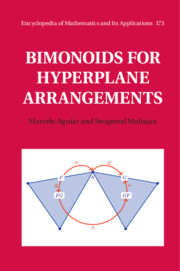Book contents
- Frontmatter
- Contents
- Preface
- Introduction
- Part I Species and operads
- Part II Basic theory of bimonoids
- Part III Structure theory for bimonoids
- Chapter 13 Loday–Ronco, Leray–Samelson, Borel–Hopf
- Chapter 14 Hoffman–Newman–Radford
- Chapter 15 Freeness under Hadamard products
- Chapter 16 Lie monoids
- Chapter 17 Poincaré–Birkhoff–Witt and Cartier–Milnor–Moore
- Appendices
- References
- List of Notations
- List of Tables
- Author Index
- Subject Index
Chapter 15 - Freeness under Hadamard products
from Part III - Structure theory for bimonoids
Published online by Cambridge University Press: 28 February 2020
- Frontmatter
- Contents
- Preface
- Introduction
- Part I Species and operads
- Part II Basic theory of bimonoids
- Part III Structure theory for bimonoids
- Chapter 13 Loday–Ronco, Leray–Samelson, Borel–Hopf
- Chapter 14 Hoffman–Newman–Radford
- Chapter 15 Freeness under Hadamard products
- Chapter 16 Lie monoids
- Chapter 17 Poincaré–Birkhoff–Witt and Cartier–Milnor–Moore
- Appendices
- References
- List of Notations
- List of Tables
- Author Index
- Subject Index
Summary
In this chapter, we study further the Hadamard product on species. The Hadamard product of two free monoids is again free. Similarly, the Hadamard product of two free commutative monoids is again free commutative. In either case, we give an explicit formula for a basis of the Hadamard product in terms of bases of its two factors. It involves the meet operation on faces and flats, respectively. We also show that the Hadamard product of bimonoids is free as a monoid if one of two factors is free as a monoid. We study in detail the Hadamard product of the free bimonoid on a comonoid with the cofree bimonoid on a monoid. It is neither commutative nor cocommutative, so Borel-Hopf does not apply. This bimonoid is both free and cofree. Interestingly, we prove this using Loday-Ronco (which is a theorem about 0-bimonoids). We also give a cancelation-free formula for its antipode. We give an explicit description of its primitive part, and more generally, its primitive filtration. An illustrative example of this construction is the bimonoid of pairs of chambers. We give a parallel discussion for a commutative counterpart where we take the Hadamard product of the free commutative bimonoid on a cocommutative comonoid with the cofree cocommutative bimonoid on a commutative monoid. (Since this bimonoid is bicommutative, it can also be tackled using Leray-Samelson.)
Keywords
- Type
- Chapter
- Information
- Bimonoids for Hyperplane Arrangements , pp. 609 - 637Publisher: Cambridge University PressPrint publication year: 2020



